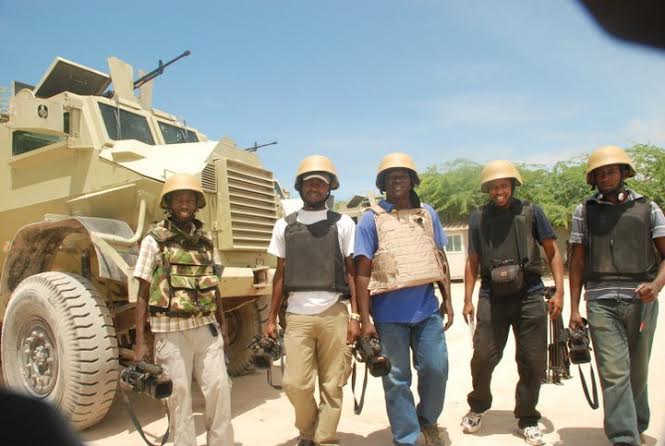
Ugandan journalists covering peace keeping mission in Somalia. Photo shared by Aidah Nalubega on Facebook. Used with permission
Despite challenges to press freedom from the government, Uganda generally has a vibrant media industry. According to Freedom House, there are more than two dozen daily and weekly newspapers and more than 180 private radio stations.
But some argue that the quality of journalism in Uganda is ‘going to the dogs’. Stories and analyses lack depth and quality. Several issues, particularly those of a political nature, remain ignored because journalists do not have the courage to question what is going on in the country.
According to the Kampala-based African Centre for Media Excellence, Ugandan journalists have also been accused many times of engaging in corruption to cover up stories.
Around 100 journalists were reportedly paid money in 2014 for favourable coverage of Uganda's former Prime Minister Amama Mbabazi. In 2011, the government allocated money to pay journalists to promote positive coverage of government projects, particularly in the oil sector.
Samson Tusiime, a lawyer by profession and the co-founder of Veritas Interactive, @SchoolPlusUg and @QlikSocial, fired the following questions to Ugandan journalists:
I would like any journalist in print to tell me why I should take them seriously when they sell 30K copies yet we are 38M Ugandan.
— Sam (@Samwyri) May 1, 2015
I would like any journalist to tell us why violent crime has a pattern of coordination and leadership yet we never arrest top shots
— Sam (@Samwyri) May 1, 2015
I would want any journalist to tell me how investing $300M in car production for Kira EV is a comparative advantage for Uganda
— Sam (@Samwyri) May 1, 2015
Kiira EV is Uganda's first electric car that was built by Makerere University students in 2011.
Tusiime further asked them to verify statistics that non-governmental organizations release to the public:
I would also like a journalist to interrogate NGOs stats of 300K children are aborted every year. That's like 1% of Uganda kila year
— Sam (@Samwyri) May 1, 2015
I am challenging any journalist to tell what is actually involved in the UGX 1B for every KM [Kilometer] tarmacked.
— Sam (@Samwyri) May 1, 2015
UGX is the Ugandan shilling. One dollar is equivalent to 2,990 UGX.
I am also challenging any journalist to tell us which Ugandan company is exporting illegal ivory from Ituri and other provinces
— Sam (@Samwyri) May 1, 2015
Ituri is in the North Eastern Province in the Democratic Republic of Congo. The Ituri forest is home to the largest remaining population of forest elephants.
I would like a journalist/researcher to tell us why our fish are dwindling yet there is no correlation to fish exports and consumption.
— Sam (@Samwyri) May 1, 2015
I am challenging any journalist how a single bridge that's not on a major river can cost UGX 7B
— Sam (@Samwyri) May 1, 2015
I am also challenging any journalist to ask why we spend $800K on tourism promotion and marketing , an industry that earns $400M
— Sam (@Samwyri) May 1, 2015
I am also challenging any journalist to tell us why we export more gold than what we actually mine.
— Sam (@Samwyri) May 1, 2015
I am challenging any journalist worth their salt to expose police cartels extorting money from people under the police bond scam.Any takers?
— Sam (@Samwyri) May 1, 2015
These questions led to the creation of #SamwyriQNS hashtag where other Ugandans joined Samson Tusiime in questioning Ugandan journalists:
Why did Uganda conceal the Kibwetere report even after destroying massacre site? #SamwyriQns
— Sam Agona (@samagona) May 2, 2015
Joseph Kibweteere is the cult leader of the Movement for the Restoration of the Ten Commandments of God. A hundred members of the cult were burnt to death in 2000.
Julie, a social media enthusiast, challenged journalists:
#SamwyriQNS an explanation is needed on why we import dairy products yet the country can produce more than we can consume.
— Elektrolyte (@julimuffn) May 2, 2015
This user admitted that these were tough questions:
These #SamwyriQNS are a hard paper. My journalists friends have said no to most of them. They fear for their lives.
— Only In 256 (@OnlyIn256) May 2, 2015
Kevin, a Ugandan blogger, noted:
TL Journalists are usually quickest to jump on trending* stories. But I don't see any jumping to give @Samwyri answers. #SamwyriQNS
— Kevin™ (@kevrx) May 2, 2015
Frank Tumusiime, a water and sanitation specialist, revealed one of the reasons that may be behind falling journalism standards in Uganda:
Media houses keep young journos on payroll without contracts. What quality of articles do we expect of folks without security? #SamwyriQNS
— Fredrick Tumusiime (@tufre80) May 2, 2015
Another one, Daneri Akiiki, said:
As soon His Highness the Aga Khan lands in Ug, his 1st courtesy call is Statehouse and one expects newspapers to dig into #SamwyriQNS; No!
— Daneri Akiiki (@_pensioner) May 2, 2015
The Aga Khan owns the largest private media house in East and Central Africa.
For those journalists who do dare to report on sensitive issues, they have regularly faced harassment from the government. In May 2013, Ugandan authorities shut down two newspapers after they reported on a letter written by the country's coordinator of intelligence services asking for an investigation into a plan to groom the eldest son of President Yoweri Museveni to succeed the the leader.






